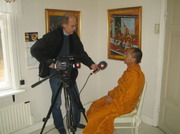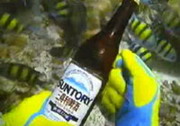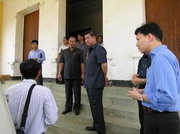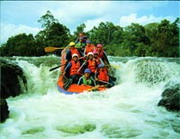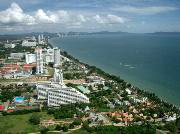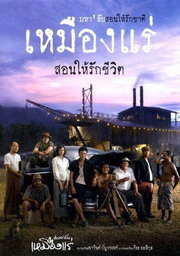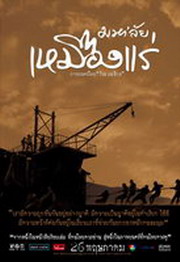| . |
Thailand Movie Companies are starting
to produce more international standard films. It is just a shame that
they (The Thai movie producers) don't realize it. The potential for
"foreign films" ,outside of the special event film shows, is huge.
However one thing they will need to fix is either dubbing into English
or adding quality English subtitles.
Here is an informative article about the
state of the Thai Movie business.
This year finds us at perhaps the most
important juncture in the history of Thai cinema. Until recently
focusing primarily on films for domestic consumption, Thailand's film
industry has captured global attention following a three-year streak of
film hits at cinema festivals around the world. Now, more than ever
before, fans of world cinema have come to appreciate what Thai directors
have to offer.
Thailand began experimenting with film very early in the history of
world cinema. Within five years of the Lumičre brothers' historic first
public film showing in 1895, Siam's Prince Sanbhassatra imported
film-making equipment and began documenting the royal ceremonies of his
elder brother, King Rama V.
In 1922, Hollywood director Henry MacRae was hired to direct the silent
Nang Sao Suwan, which used Thai actors for all roles and was released in
Thailand in 1924. The storyline followed the tribulations of a beautiful
young Thai girl with too many suitors. Unfortunately no viewable print
of this early film appears to have survived.
Bangkok Film kicked off the domestic film industry with the launch of
the first Thai-directed silent movie, Chok Sorng Chan, in 1927. In
Thailand, silent films proved to be more popular than talkies right into
the 1960s, and as late as 1969 Thai studios were still producing them
from 16mm stock. Perhaps partially influenced by India's famed masala
movies (which gained a strong following in post-WWII Bangkok), film
companies blended romance, comedy, melodrama, and adventure to give Thai
audiences a little bit of everything.
The arrival of 35mm movies in Thailand around this same time brought
with it a proliferation of modern cinema halls and a surge in
movie-making. During this era, Thai films attracted more cinema-goers
than nang farang (as the Thais called movies from Europe and America),
and today many Thais consider the 60s to be a golden age of Thai cinema.
Over half of the approximately 75 films produced annually during this
period starred the much-admired onscreen duo of actor Mit Chaibancha and
actress Petchara Chaowaraj. One of the last and most famous films of the
era was Mit-Petchara's Mon Rak Luk Thung, a musical rhapsodizing Thai
rural life. The 1970 film played in Bangkok cinemas for a solid six
months, its popularity spurred by the film's best-selling soundtrack
album and Mit's accidental death while filming another Thai production,
Insee Thong.
Despite the founding of a government committee that same year to promote
Thai cinema, Thai film production in the 70s and early 80s was mostly
limited to inexpensive action or romance stories. Among notable
exceptions, 1983's Child of the Northeast (Luk Isan), based on a Thai
novel of the same name, followed the ups and downs of a farming family
living in drought-ridden Isan. Luk Isan became one of the first popular
films to offer urban Thais an understanding of the hardships endured by
many Northeasterners, and initiated a social drama sub-genre that
continues to this day.
Butterfly and Flower (Peesua lae Dokmai), again drawn from a popular
Thai novel of the time, highlighted the hardships faced by a boy forced
by economic circumstance to smuggle rice across the Thai-Malaysian
border. Aside from once again exposing Thai audiences to regional
poverty, the 1985 movie broke new ground by portraying a Buddhist-Muslim
romance. Butterfly and Flower delighted the Thai public when it earned a
Best Film award at the 1986 East-West Film Festival in Honolulu.
Despite this budding acclaim, the Thai movie industry almost died during
the 80s and 90s, swamped by Hollywood extravaganzas and the boom era's
taste for anything imported. From a 1970s peak of a couple hundred
releases per year, the Thai output shrank to an average of only 10 films
a year by 1997.
While the Southeast Asian economic crisis that year threatened to
further bludgeon the ailing industry, a lack of larger budgets coupled
with the need to compete with foreign films brought about a new emphasis
on quality rather than quantity. The current turn-of-the-millennium era
sees a new generation of seriously good Thai directors, several of whom
studied film abroad during Thailand's 80s and early 90s boom period.
Recent directorial efforts have been so encouraging that Thai and
foreign critics alike speak of a current Thai 'new wave'. Avoiding the
soap operatics of the past, the current crop of directors favor gritty
realism, artistic innovation, and a strengthened Thai identity. Pen-Ek
Ratanaruang's Fun Bar Karaoke, a 1997 satire of Bangkok life in which
the main characters are an ageing Thai playboy and his daughter,
received critical acclaim for its true-to-life depiction of modern urban
living blended with sage humor. The first feature-length outing by a
young Thai who is fast becoming one of the kingdom's most
internationally noted directors, the film played well to international
audiences but achieved only limited box-office success at home.
Similarly Nonzee Nimibutr's Dang Bireley's Young Gangsters (2499
Antaphan Krong Meuang) was hailed abroad - winning first prize at the
1997 Brussels International Film Festival - but only modestly successful
in Thailand
A harbinger of things to come for the Thai film industry arrived with
Nonzee Nimibutr's 1998 release of Nang Nak, an exquisite re-telling of a
Thai spirit tale that had seen no fewer than 20 previous cinematic
renderings. Nang Nak not only featured excellent acting and period
detailing, but managed to transform Nak into a sympathetic character
rather than a horrific ghost. The film became the largest-grossing film
in Thai history, out-earning even Titanic, and earned awards for best
director, best art director, and best sound at the 1999 Asia-Pacific
Film Festival.
Hot on the heels of Nang Nak's success came the 2000 film Satree Lex
(Iron Ladies), which humorously dramatized the real-life exploits of a
Lampang volleyball team made up almost entirely of transvestites and
transsexuals. At home, this Yongyoot Thongkongtoon-directed film became
Thai cinema's second largest-grossing effort to date, and was the first
Thai film ever to play the art house cinemas of Europe and America in
general release.
The next Thai film to garner international attention was 2000's
Suriyothai, an historic epic directed by Prince Chatrichalerm Yukol.
Forty months and US$15 million in the making, the three-hour film
lavishly narrates a well known episode in Thai history in which an
Ayuthaya queen sacrifices herself at the 1548 Battle of Hanthawaddy to
save her king's life. Recently legendary American producer-director
Francis Ford Coppola agreed to re-edit the film to create a shorter,
more internationally palatable version for general release.
The year 2000 also introduced the Oxide brothers, Danny and Pang, to
Thai and foreign film festival audiences with the release of Bangkok
Dangerous (Krung Thep Antharai). Influenced in equal parts by Hong Kong
director John Woo and American writer-director Quentin Tarantino, this
story of a deaf-mute hit man who finds love won a Discovery award at the
Toronto Film Festival and Best Director, Runner-Up, in Seattle. Although
the Oxides hail from Hong Kong, Thailand has become their main cinematic
inspiration.
In 2001, Nonzee Nimibutr returned with Jan Dara, a cinematic rendition
of Utsana Pleungtham's controversially erotic 1966 novel of the same
name. Filmed almost entirely on soundstages save for outdoor scenes shot
in Luang Prabang, Laos, the film was critically compared with Vietnam's
famous Scent of Green Papaya. The Globe & Mail called it a "sultry
melodrama with a Thai twist."
Encouraged by critical acclaim abroad and box office receipts at home,
Thai producers nearly tripled their output from a total of 12
Thai-language movies in 2001 to around 30 new productions in 2002.
Quality continues to improve as well, as Thai films have assumed a newly
favored identity on the international film scene. The Vancouver
International Festival, for example, increased its screening of Thai
films from three in 2001 to five in 2002.
For indications that Thailand's role in world cinema will continue to
expand, one need look no farther than Pen-Ek's latest effort, Mon Rak
Transistor. This acclaimed film broke ground by seizing a thoroughly
Thai movie theme - the tragic-comic odyssey of a young villager who
tries to crack the big time luk thung music scene in Bangkok - and
upgrading production values to the highest international standards. The
2001 release was honored with a special Directors Fortnight showing at
Cannes 2002, and went on to earn Best Asian Film at Seattle 02 and the
Audience Award at Vienna 02.
One of Thai cinema's finest moments arrived when Cannes 2002 chose
Blissfully Yours (Sut Sanaeha) for the coveted Un Certain Regard (Of
Special Consideration) screening, an event that showcases notable work
by new directors. Helmed by 31-year-old Apichatpong Weerasethakul, the
film echoes Butterfly and Flower in its presentation of a budding
romance between a Thai woman and an illegal Burmese immigrant.
Another favorite on the 2002 festival circuit, and a blockbuster in
Thailand as well, Jira Malikul's Mekhong Full Moon Party (15 Kham Deuan
11), juxtaposes folk beliefs about mysterious 'dragon lights' emanating
from Mekong River with the skepticism of Bangkok scientists and news
media, as well as with Thai Buddhism. As with Mon Rak Transistor, the
film affectionately displays everyday Thai culture for the whole world
to enjoy. It's also the first Thai feature film where most of the script
is written in the Isan dialect, thus necessitating standard Thai
subtitles.
Another watershed occurred when the 2002 London Thai Film Festival
screened 16 Thai films over a one-week period, becoming the first such
event outside of the country. The only way an event like this has become
feasible is because so many Thai films are now released with English
subtitles, something almost unheard of even five years ago.
Just as significantly, the prestigious CineAsia convention and trade
show, which focuses on the Asia-Pacific film marketplace, shifted to
Bangkok last year after eight years residence in Hong Kong. One of the
reasons cited for the move was the availability of over 300 quality
screening venues in Bangkok.
The January 2002 inauguration of the Bangkok International Film
Festival, exhibiting more than 70 new features from around the world,
further demonstrates that Thailand lies at the epicenter of a growing
film industry.
With more Thai films filling cinema houses outside of Asia, and with
more films seeing screens in Thailand then ever before, it would appear
that a new golden age for Thai movies has begun.
Joe Cummings -
http://www.tatnews.org/emagazine/1728.asp
|
. |

